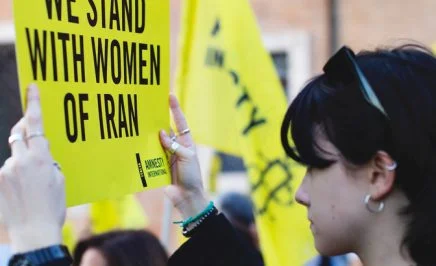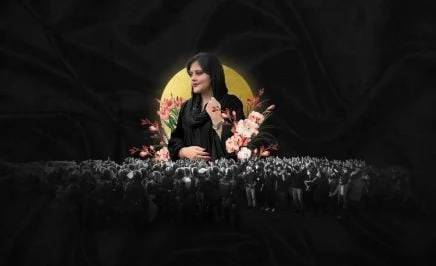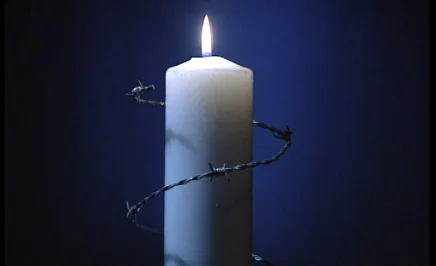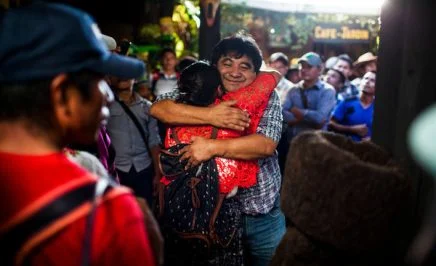In 2019, Yasaman and Monireh received 16 years in prison for speaking out against Iran’s forced veiling laws. In Iran, it’s a crime for women to appear in public with their hair uncovered. This cruel punishment is part of a wider crackdown on women campaigning against discriminatory forced veiling laws in Iran.
What happened?
On International Women’s Day in 2019, Yasaman Aryani and her mother Monireh Arabshahi took off their headscarves and walked through a women-only train carriage in Tehran to campaign against forced veiling in Iran.
As they handed out white flowers to passengers, Yasaman spoke of her hopes for a future where all women would be free to choose what to wear. After a video of this went viral, Yasaman and Monireh were arrested and sentenced to 16 years in prison for “inciting and facilitating corruption and prostitution” through promoting “unveiling”.
In February 2023, Yasaman and Monireh were released after spending nearly four years in prison. Their freedom would not have been possible without hundreds of thousands of people from across the world speaking out, maintaining pressure, and demanding justice.
How did Amnesty respond?
Iran’s forced veiling laws are a breach of Iranian women’s rights to freedom of expression, belief and religion.
Amnesty has called on the international community to set up an independent investigative mechanism, to investigate human rights abuses by the Iranian authorities and can hold those responsible accountable.
“The criminalization of women and girls for not wearing the veil is an extreme form of gender-based discrimination… Instead of persecuting and jailing women who are standing up to this outrageous injustice, Iran’s authorities should immediately and unconditionally release all women’s rights defenders detained for their peaceful activism.”
Magdalena Mughrabi, Deputy Middle East and North Africa Director at Amnesty International
After Yasaman’s arrest, Amnesty started a petition calling on Iranian authorities for her release. An incredible 100,000 supporters in Australia, and over one million supporters around the world took action for Yasaman and Monireh demanding their freedom.
Watch as Yasaman is reunited with her sister:
Women’s rights in Iran
Woman. Life. Freedom.
It has become the rallying cry of protesters in Iran. A movement made up of everyday people risking their lives to challenge injustice, and demand their human rights be upheld. A movement with brave women and girls at the helm.
The death in custody of 22-year-old Mahsa Amini at the hands of Iran’s “morality” police last year sparked an unprecedented uprising that continues to this day. The world has watched on in horror as Iranian authorities have responded with impunity – and in awe of the women and girls defying Iran’s discriminatory and degrading compulsory veiling laws.
A growing movement against forced veiling laws has emerged inside Iran, with women and girls performing courageous acts of defiance. Men and women who actively choose to wear hijab have joined too – because the movement is about choice: a woman’s right to choose what to wear without fear of harassment, violence, threats and imprisonment.
What’s next?
The pressure of our collective voices can make a difference – Yasaman and Monireh’s stories are one example.
Last year, Iranian activist Atena Daemi was also finally released from prison after being locked up behind bars for five years. Thousands of people from around the world took action for Atena – including 22,000 Australians.
“I hope that we’ll achieve our first and last wish, which is freedom, public awareness and the realisation of human rights.”
Atena Daemi, Iranian activist
Together we can keep hope alive – and raising your voice is more important than ever.
Now, Iranian-Kurdish woman Zeynab Jalalian also needs our help. For her advocacy empowering women and girls, she has spent the last 15 years behind bars – where she is currently serving a life prison sentence.
Stand in solidarity with women and girls in Iran, and call for her immediate release.
Women and girls have fought hard for their human rights over the years – to be educated; to access health care, to own property, to vote, and much more. But, around the world, they continue to face violence and discrimination. Learn more about our women’s rights campaign work.
When courageous people protest, they make the world a better place. We must protect the right to protest wherever it is restricted and whenever it is at risk. Learn more about our right to protest campaign work.





